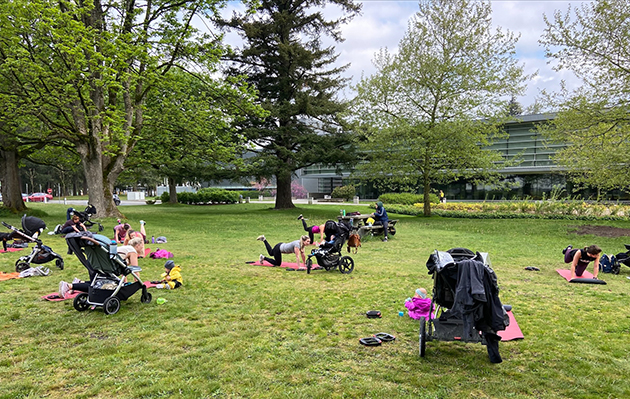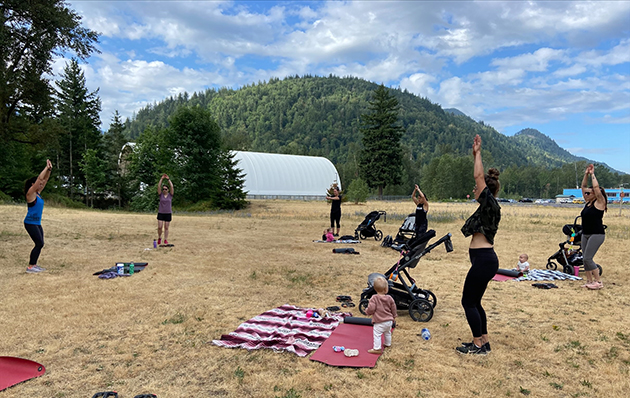Fitness classes validate correlation between exercise and postpartum mental health
By Gerald Narciso
 Like clockwork, the new moms arrived in workout gear, sometimes with their babies on their hips. Every Tuesday and Thursday morning last spring at a grassy area on the Chilliwack campus, the women would laugh together and collectively do lunges, pushups, and squats. For an extra challenge, they’d add weights or even lift newborns.
Like clockwork, the new moms arrived in workout gear, sometimes with their babies on their hips. Every Tuesday and Thursday morning last spring at a grassy area on the Chilliwack campus, the women would laugh together and collectively do lunges, pushups, and squats. For an extra challenge, they’d add weights or even lift newborns.
But this class was not an ordinary group fitness class. It was part of the Moms on the Move research project, designed to study the correlation between exercise and the mental health benefits for new mothers. The postpartum fitness study was led by Dr. Gillian Hatfield, assistant professor in the UFV School of Kinesiology and conducted with colleagues Dr. Iris Lesser and Dr. Carl Nienhuis.
On top of the workout reps, the women were asked to rate their anxiety before class and to provide a measure of their rating of exertion after each class. They also completed an online questionnaire at the beginning and the end of the eight-week program, which started in May 2021.
“We wanted to see whether this form of exercise with other mothers would benefit mental well-being, specifically anxiety,” says Lesser. “We learned more about their challenges with physical activity and whether the program may have improved their ability to confidently engage in physical activity.”
Sleep deprivation, lack of self-care, and physical and mental health challenges are some of the challenges that postpartum women face. Lesser herself has struggled with postnatal anxiety and depression after the birth of her first child in 2016. She found fitness helped offset some of her symptoms.
“Engaging in physical activity with other new moms after the birth of my daughter was one of the components that got me through a tough year,” says Lesser. “It certainly made me realize how important my activity was for mental well-being and therefore has made it a high priority in my life.”
 The experience inspired Lesser to conduct a research study in 2020. She consulted with her colleague, Dr. Gillian Hatfield, who is a fitness instructor with Les Mills International. She recommended the TONE program, geared towards women on the mental health benefits of new mothers.
The experience inspired Lesser to conduct a research study in 2020. She consulted with her colleague, Dr. Gillian Hatfield, who is a fitness instructor with Les Mills International. She recommended the TONE program, geared towards women on the mental health benefits of new mothers.
With the global pandemic, the mental health crisis has been increasingly prevalent — postpartum women are no exception. Since the onset of COVID-19, these mental health issues have been amplified with 40 percent of postpartum women reporting depression compared to 15 percent pre-pandemic according to a 2020 study by Dr. Margie H. Davenport of the University of Alberta’s Kinesiology department.
There were 21 women, with babies under the required nine months of age, who participated in the bi-weekly, eight-week program. Two classes were offered: one at 9 am and one at 11 am in order to keep under the 10-person outdoor limit imposed by the Public Health Officer at that time.
Lesser and team are still analyzing the results, but their preliminary findings found a significant difference in depression post-program along with a non-significant improvement in perceived stress and trait anxiety. In addition, they found a significant improvement in meeting basic psychological needs, including autonomy, competence, and relatedness.
“I think we can make the statement that women fare better when they engage in this form of supported group exercise,” Lesser says. “It will be interesting to see whether they can keep up with physical activity on their own and continue to be well.”
The participants will be following up with Lesser’s team in December to see how they are faring – especially with a return to work for many.
In addition, Lesser is currently working with Dr. Carl Nienhuis at UFV and Dr. Corliss Bean at Brock University on a new study to get a better picture of the experience of women with physical activity in the postnatal phase. Lesser is currently recruiting moms less than one year postpartum for this study (interested participants can complete the survey here).
“New moms are superheroes,” Lesser concluded. “Our bodies change after having a baby and how to navigate a return to exercise through the physical shift and what often becomes an identity shift. We’re trying to find fun and safe ways for them to cope with those challenges long term.”





